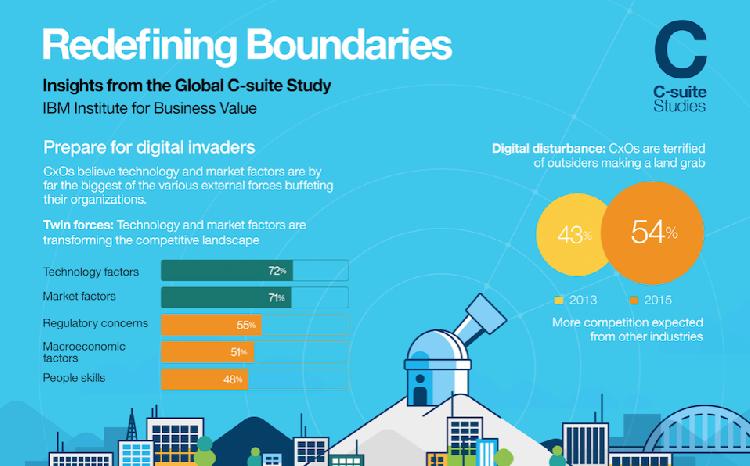
Region’s C-suite Executives See “Uberization” As Primary Competitive Threat
The trend of “uberization” or industry disruption caused by an unlikely competitor has become a dominant concern of the C-suite, finds a new IBM study. In just two years, the percentage of global C-suite leaders who expect to contend with competition from outside their industry from 43 percent in 2013 to 54 percent today.
Conducted by IBM’s Institute for Business Value, the report reveals that C-suite executives both globally and in the Middle East and Pakistan now expect industry convergence to be the primary force impacting their business in the next three to five years. CxOs in the Middle East also see the “anywhere” workplace and rising cyber risk being nearly as impactful as industry convergence.
“When it comes to the competition, C-suite leaders clearly have a new threat to consider -- one that is often invisible until it is too late,” said Amr Mahfouz, Global Business Services Leader, IBM Saudi Arabia. “At the same time, the highest performers see advances in areas like cognitive computing and systems that can sense and learn as the key to dealing with disruptive events, showing a path forward for all executives.”
The study also reveals that C-suite leaders from the highest-performing companies are 24 percent more likely to be focused on cognitive computing than market followers. The study recommends enterprises use predictive and cognitive analytics to help forecast what might happen with a greater level of confidence and get ahead of unseen competitors.
Beware Unwelcome Intruders
The biggest risk to businesses used to be a new rival with a better or cheaper offering, making it relatively simple to alter strategies. Today, entrenched players are being threatened by new entrants with completely different business models, as well as smaller, more agile players unencumbered by legacy infrastructure.
In turn, fifty-four percent of global CxOs are looking to bring innovation in from outside sources and 70 percent plan to expand their partner network—with that number even higher in the Middle East at 79 percent.
Implement Customer Feedback, Don’t Just Ask for It
Many CxOs interviewed freely admitted that they find it hard to see what’s coming next. Yet, when it comes to identifying and exploring new trends and technologies, only half of respondents are utilizing customer feedback. This despite the fact that in IBM’s 2013 Global C-suite Study, 60 percent of CEOs said they planned to directly engage their customers and proactively apply what they learned to set their business agendas. Two years later, it’s still a gap waiting to be closed.
Most CxOs anticipate changing the way their organizations engage with customers. Sixty-six percent of CxOs expect to focus on customers as individuals -- up 22 percent from 2013 -- and 81 percent plan to drive more digital interaction, a 19 percent increase from two years ago. CxOs from the Middle East are even more convinced about customer interactions moving online, with 91 percent planning to drive more digital interaction.
Role and Risks of Technology
CEOs put technology at the top of the list, as they have for the past four years. But now, for the first time ever, the other members of the C-suite also see technology as the main game-changer.
Regionally, in the Middle East, CxOs are in strong agreement about the impact of cloud computing, mobile solutions, the Internet of Things and cognitive computing as the technologies most likely to revolutionize their business. When it comes to risks, two years ago IT security ranked low on the list of concerns globally. Now, 68 percent of respondents also rank IT security as their number-one enterprise risk.
The IBM study, “Redefining Boundaries: Insights from the Global C-suite Study,” is based on findings from more than 5,200 CEOs, CMOs, CFOs, CIOs and other C-suite leaders across 21 industries in more than 70 countries. The respondents -- most of whom participated in face-to-face interviews -- represent a wide range of public and private enterprises.



























